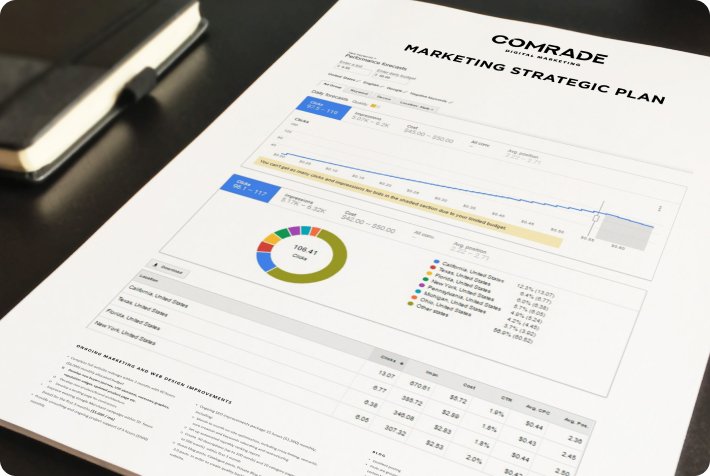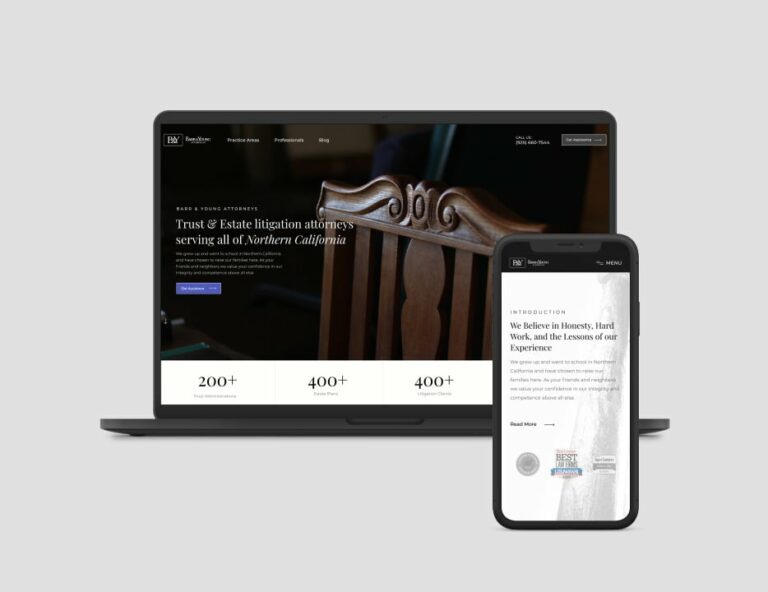
What Is Off-Page SEO?
Off-page SEO is a search engine optimization tactic encompassing various activities employed to increase domain authority via getting backlinks from other sites. While factors like content and technical performance weigh in on page rankings, search engines also use backlinks to assess a website’s credibility.
A website without quality off-page SEO links, simply won’t rank as high, which is why having an off-page SEO strategy is so valuable. Off-site SEO is an essential aspect of digital marketing that supports your overarching strategy by adding relevance, trustworthiness, and authority to your domain.
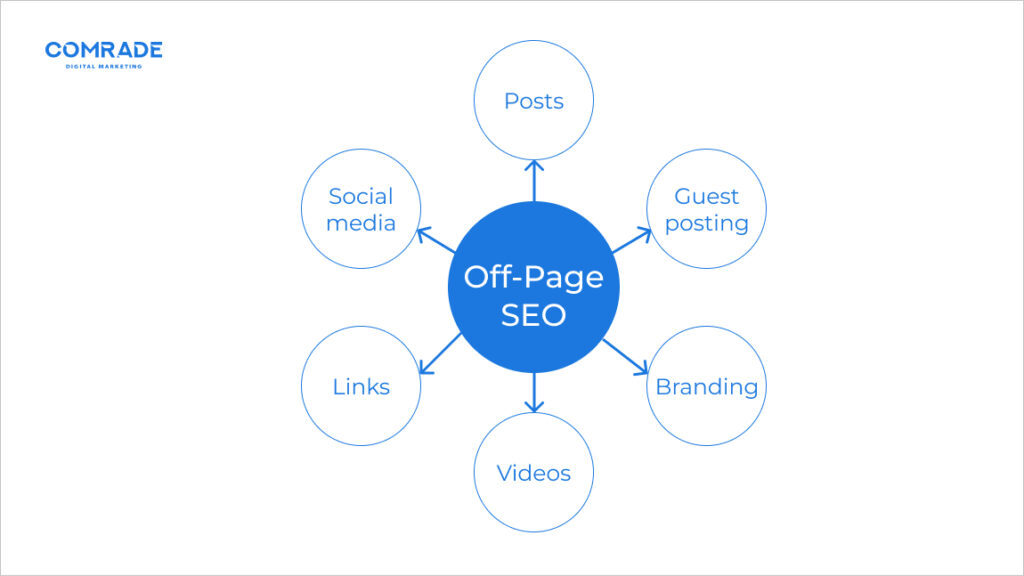
How Does Link Building Work?
Backlinks or inbound links are links from one website to another. Search engines use backlinks when determining page rank because they signal when noteworthy content maintains a modicum of authority. The primary purpose of off-page SEO is to produce quality, relevant and trustworthy backlinks.
Guest blogging, social media promotion, manual outreach, and pursuing competitors’ backlinks are some of the best ways to enhance off-page SEO. Other tactics like citation, branding, and content marketing also help businesses gain a competitive advantage in a sea of online content, which according to the Hosting Tribunal, amounts to 4.2 million pages on the World Wide Web.
Why Is Off-Page SEO Important?
Google uses over two hundred factors to rank websites, of which off-page SEO is within the top 20. If two websites have the same quality on-page SEO score, then off-page SEO becomes the tie-breaker. Off-page SEO provides search engines with an indication of how the world perceives your website.
A well-maintained and useful website with credible backlinks offers a vote of confidence to search engines. And credible websites matter because search engines strive to provide users with precise answers to their queries. While it’s not the only factor, off-page SEO fulfills a critical role in SERPs ranks.
Off-Page SEO Factors and Important Google Ranking Factors
PageRank (PA) is an algorithm used by Google Search to rank web pages in their search engine results. It works by counting the number of and quality of links to a page to determine a rough estimate of how important a website is.
The underlying assumption is the more authoritative a website is, the more links it will have from other websites. Because search engines shifted from primarily only using keywords as a ranking signal, acquiring high-quality links is critical to SEO efforts.
How Does Google Evaluate Links?
Link building is one of the more challenging aspects of SEO because it takes substantial effort to garner high-quality backlinks. Nowadays, it’s impossible to put spammy links across the web to manipulate search rankings without getting a Google penalty.
Below are the most salient factors Google uses when evaluating search engine ranking:
Relevance
Backlinks should be relevant in four ways: domain to domain, page to page, domain to page or link to page. Links must be located on web pages within the right topical range. For example, if you’re a personal injury lawyer, you won’t link to a page about restaurants, unless this is relevant and ties in with a case study.
Website Diversity
Search engines prefer inbound link profiles with domain diversity, which is the number of unique and distinguished domains from which your website has inbound links. For this reason, it’s wise to have incoming links from a range of authority blogs, sites, magazines, directories, and so on.
Link Location
Google prioritizes search intent, meaning links should be incorporated seamlessly throughout website content. Irrelevant links, i.e., those inserted in sidebars or footers purely for ranking, are considered a no-go. Here you can learn more about local SEO tools.
Human Value
A search engine’s main goal is to provide users with the most relevant and valuable content. When other websites link back to yours it should be because your information supplements and supports their content. Hence, the human value factor. Your backlinks should demonstrate an understanding of your target audience and offer them unique value.
Uniqueness
Brand mentions in the form of quality links from authoritative sights that include your website present excellent opportunities to build a strong backlink profile. Forum websites and unique events, where your brand is included, are highly prized, especially when your competitors aren’t present.
Technical Elements
There are also technical elements like nofollow, redirects, alt attributes, anchor text and robots.txt that affect how search engines interpret relevance and authority. Conducting a backlink audit will point to any technical aspects of your off-page SEO strategy that needs further optimization or fixing.
Delivering Business Results: Our Digital Marketing Case Studies
What Is the Difference Between On-Page, Technical, and Off-Site SEO?
At its most basic level, SEO means search engine optimization and refers to the process of generating organic (free or natural) on a search engine. There are three main types of search engine optimization needed to effectively rank on search engines.
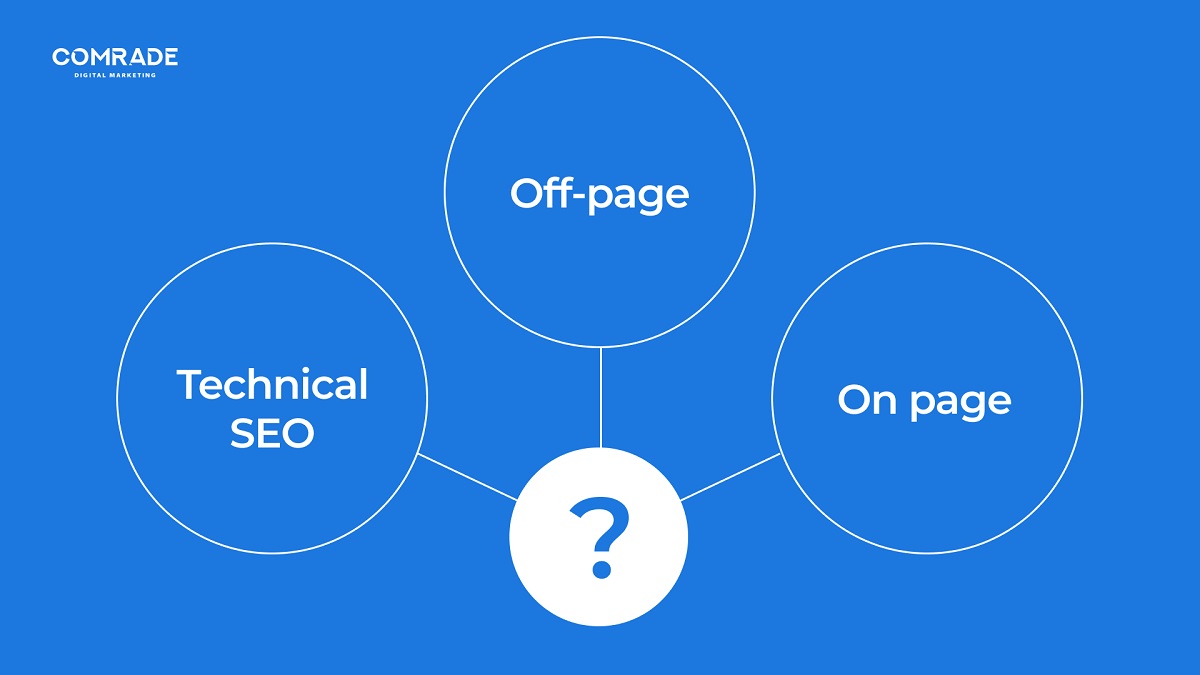
On-Page SEO
The most well-known and commonly spoken about is on-page SEO. This relates to all content on your website and strategies used to optimize an individual website and landing pages. On-page SEO tells search engines what a website’s content is about and how relevant it is to users.
Publishing relevant content, conducting keyword research, optimizing URL structure, headlines, HTML tags and images all fall under on-page SEO in 2024. Regardless of the medium, content should always be created with user experience in mind, as Google prioritizes this aspect of SEO too.
Technical SEO
Technical SEO is related to all non-content elements of a website, such as its architecture and layout. It ensures a website meets all the technical requirements needed for search engines to crawl and index them.
Good technical SEO improves a site’s backend structure and foundation. Elements related to technical SEO include: site speed, mobile-friendliness, indexing, crawlability, site architecture, structured data, and security.
How Is Off-page SEO Different?
While off-page SEO has the same goal, it’s altogether different from technical and on-page SEO. Tactics deployed help reinforce and influence a website’s relationship with other websites.
Obviously, you require on-page and technical SEO to make your website reliable, trustworthy and reputable to search engines and consumers. Once you’ve achieved this, you should look at building a large volume of backlinks to reinforce your website’s authority.
The key difference between off-page SEO and the former two is that it isn’t as easily controlled due to reliance on other sites, platforms and applications needed to build credibility. Of the three, no one should take precedence, as all are necessary to develop a strong link building strategy.
How Does Off-Page SEO Link Building Work?
Link building is the foundation of off-page SEO. There are three main types of backlinks defined by how they are earned: natural links, manually built links, and self-created links.
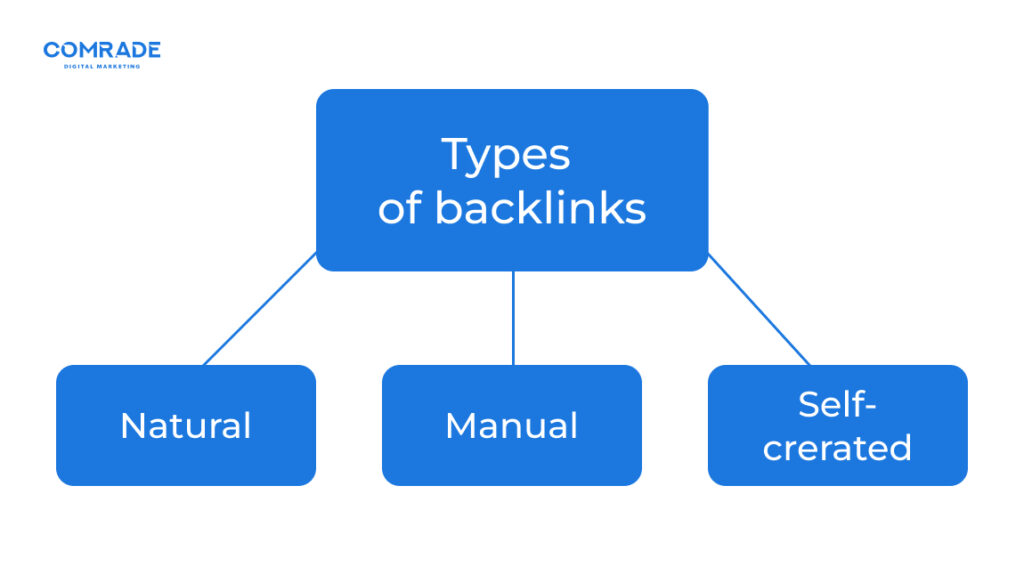
Natural Links
Natural links occur voluntarily without any interference from the website owner. For example, a blogger may publish a post on the season’s latest fashion and include a link to your clothing store because they think it’s useful for their readers and adds value to their pages.
Manual Links
Manual links are required strategically by getting customers, influencers, and publications to link to your website by sharing your content. These take time to build, as they’re mostly based on relationships and brand credibility. They can also be done through influencer marketing, which is based on paid or trade exchanges.
Self-Created Backlinks
Lastly, there are self-created backlinks, which are ethically frowned upon. These are created through dubious backlinks in online directories, forums, blog comments, and press releases with optimized anchor text.
Search engines like Google do not tolerate self-created backlinks because they attempt to trick them into thinking your website content is valuable when it might not be. In fact, Google has been known to penalize websites that practice questionable tactics like these.
What Is Link Juice?
It’s not enough to have random backlinks; they must also maintain a certain level of equity, which is colloquially referred to as “link juice.” As we mentioned before, not all search links are made equal.
Link equity is determined by several factors such as: the site’s popularity, the relation between the link and the site it’s being linked to, the site’s credibility, and the authority of the linking domain and page.
The best way to link build is through developing strategic relationships with relevant websites and blogs in your industry. Long-term relationships aren’t only useful for link building. If your brand is genuine, you will create fans and advocates for your business.
In some cases, you may even make valuable contacts with PR companies, journalists, and writers, who are always on the lookout for new trends, products and valuable information related to your industry.
Different Types of Backlinks
Certain backlinks offer more visibility than others, especially if you want to rank high in search results. Understanding the different types will help you build links that improve your off-page SEO.
Internal Links
While not strictly backlinks, internal links connect different pages on your website and establish a URL hierarchy. It is common practice to provide the most important pages with the most links. Internal links are useful to search engine bots as they provide a clear pathway to index and rank web pages.
For example, if you’re a shoe retailer, you might link a product page to a relevant blog or link your ‘news’ section to a new category page if you’ve launched a new shoe collection.
Guest Posting
Guest posting is one of the most effective off-site SEO link building tactics. You basically write content like blogs or articles to be published on other websites in exchange for a link back to your website.
If you’re a personal injury lawyer, for instance, you might write an opinion piece published on a respected legal website. Links can be mentioned in different places in the post, either in reference to the article’s topic or at the end when mentioning the author’s or firm’s details.
Authority Links
Considered the golden eggs of link building, authority links are from established, trusted and niche-relevant sites that have earned a degree of trust from search engines as a result of their age, quality and size. The best way to get these links is by creating high-quality content and developing a robust PR campaign.
For example, if you’re a real estate developer, and you publish a long-form article about real estate trends that Realtor Magazine links to, then you’ve struck gold.
NoFollow Links
These links have a rel=”nofollow” HTML tag applied to them that tells search engines to ignore them. Therefore, they do not pass PageRank and won’t impact search engine rankings. Nofollow links are usually applied to user-generated content (UGC) or sponsored tag links when a website doesn’t want a link to count as an editorial vote.
External Links
External links point to a target page or another domain that is not part of your website or marketing content. We don’t encourage using them on your primary web page because they direct visitors away from your website. However, they can be useful in blog posts and other marketing material when they support or add value to your content.
High-quality pages typically link to other high-quality pages; thus inserting external links with discernment makes search engines view content favorably. For example, if you’re a fashion retailer, you might post a Q&A blog with a well-known stylist about the coming season’s trends and then link to their website.
Off-Page SEO Technique for a New Website
New websites naturally need more promotion than their established counterparts. Content marketing, brand building and influencer marketing are effective off-page optimization tactics that can increase the reach and quality of your leads.
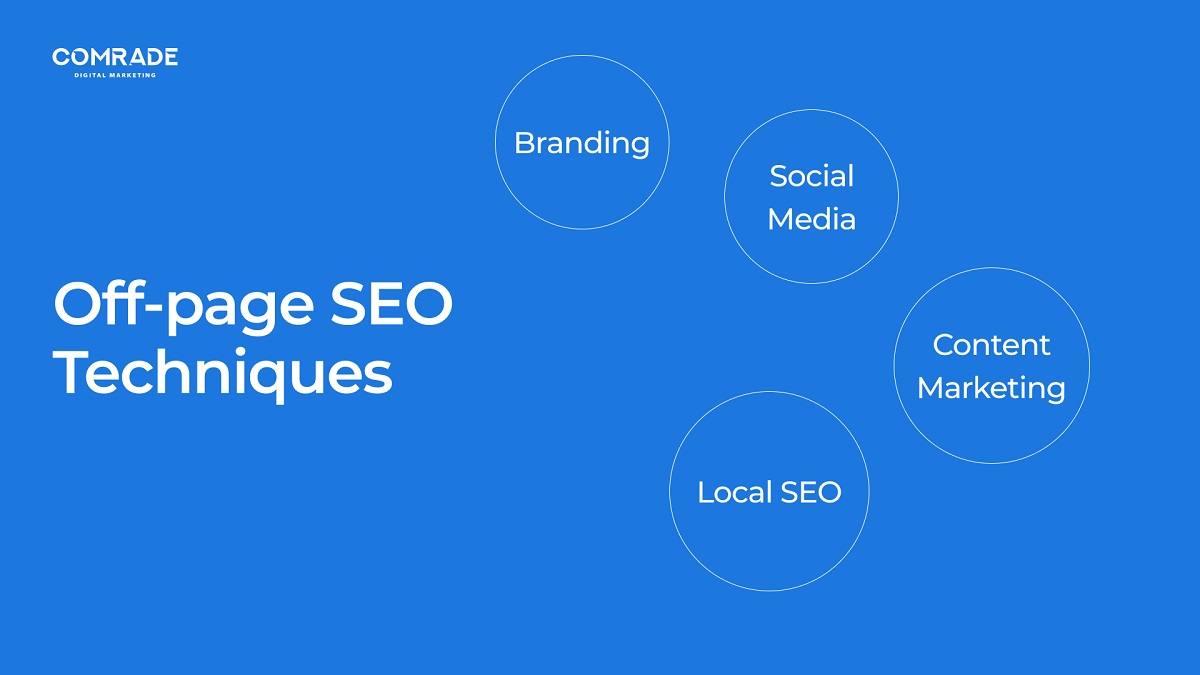
The off-page SEO tactics below also work equally well for businesses that have already established a foothold in the market.
Branding
Strong branding sends a clear message to prospective customers about your company and why it’s better than its competitors. Over time, brand identity becomes immediately recognizable. Better branding means greater visibility and awareness. Besides, a company’s online presence is arguably the single most important asset. A solid online reputation plus brand visibility equals brand power.
Coherent branding across all digital channels and platforms is one of the best ways to generate awareness. Brands with a strong presence appear more approachable than those aloof, and they build audience rapport quickly, increasing trust. The online space is highly competitive, so it’s vital to have strong branding that reflects your company’s values.
Content Marketing
Content marketing with appropriate on-page SEO will rank higher on SERPs and increase backlinks, eventually improving domain authority. It’s obvious that if your website is useful, other websites will link back to it. Having a content marketing plan that takes current trends, target audiences, and business objectives into account is crucial.
Writing guest posts is a great way to raise brand awareness and generate natural links. Search engines also love fresh content; the more you publish valuable content with strategic keywords, the higher you’ll rank. Your audience will also return to your site for updates, tips, how-to guides and tricks of the trade, boosting organic traffic.
Local SEO
Local SEO is the process of increasing the search visibility of brick-and-mortar businesses online. In theory, when people search online for a product or service you provide, your business should appear on Google Maps.
The easiest way to improve local SEO is to register a Google My Business account, gain positive customer reviews, get citations, and list your business in esteemed directories. Both citations and Google My Business listing are considered backlinks as well.
When your business is thoroughly optimized for search engines, it creates an increased opportunity to rank higher. This improves your site’s click-through rate and visibility, which in turn grows natural backlinks. A comprehensive SEO strategy takes all of these factors into consideration.
Social Media Marketing
The more users share your online content, the higher your engagement rate and the more backlinks you’re likely to have for that specific piece of content. Social media platforms provide immense opportunities for free exposure and brand development. Unless you’re paying for targeted ads, content marketing, and social media posting are generally used to amplify a brand’s voice and boost audience engagement.
Influencer Marketing
Depending on the type of content produced, influencer marketing such as blogging, for example, can provide credible backlinks, especially if the influencer has a large following.
More than that, influencer marketing also allows brands to tap into new markets, gain more customers and improve awareness. According to Marketing Profs, brands with truly authentic influencer relationships can generate up to 11 times more ROI than traditional advertising. The trick is to find a good influencer fit, so it doesn’t feel inauthentic to prospective customers.
Advanced Off-Page SEO Strategies
Link building, like all aspects of SEO, is both an art and science. The following off-page SEO techniques will scale and maximize your SEO efforts.
Broken Link Building
Broken links direct users and search bots to an empty or nonexistent webpage. They’re bad for off-page SEO and create a poor user experience.
As the name suggests, broken link building involves finding broken links and reaching out to webmasters with a resource (web page) you’ve created to replace the link.
It’s an effective off-page SEO tactic because it allows you to start a relationship with a webmaster by helping them first, which may lead to further backlinks down the line. You can use SEMrush’s broken link checker to locate new backlink opportunities.
Scholarship Link Building
Institutions like schools, colleges, and universities are highly respected by Google and other search engines. Their credibility has a profound effect on any outbound links from their websites.
If possible, you should set up a page on your website to promote scholarship or bursary funds for reputable tertiary education institutions.
As an example, if your company has anything to do with engineering, you might create a scholarship page where you offer to pay a percentage of an engineering student’s degree should they qualify for your sponsorship.
Of course, you should only engage with this type of link building if you’re committed to seeing it though, otherwise, you may face false advertising charges.
The Skyscraper Technique
Devised by the founder of Backlinko, Brian Dean, the Skyscraper Technique is an off-page SEO strategy used to create engaging content that earns quality editorial links. It’s based on three steps:
- Finding popular content that’s already been linked to from other websites.
- Creating a better piece of content on the same topic and publishing it on your website.
- Promoting your content to the right target audience.
The idea is that you take something that already has proven results and make it even better.
To use an analogy: When you see a skyscraper, you tend to be curious about what it’s like on the top floor, not the 25th or the 3rd. It’s the same with content. Both Google and users are most interested in the websites that reach the top of search engine results pages.
Partner with a Leading Link Building Agency
A website and its off-page SEO strategy are part of an evolving ecosystem while simultaneously being assessed by search engines. It’s highly competitive, but there are many ways to improve link building. While you don’t have absolute control over it, following best practices does improve your off-page SEO efforts and increase link building opportunities.
There’s no getting around off-page SEO. While it may seem like a lot of strategy and work, SEO helps keep search results fair, is cost-effective, and improves user experience. If you’re an eCommerce store looking to improve your off-page SEO strategy, we can help.
Comrade Digital Marketing is a full-service digital marketing agency dedicated to making brands thrive. Our experts offer off-page SEO services to help you rank higher and increase revenue. Call us at 312-265-0580 or contact us online to receive a free SEO website audit.








